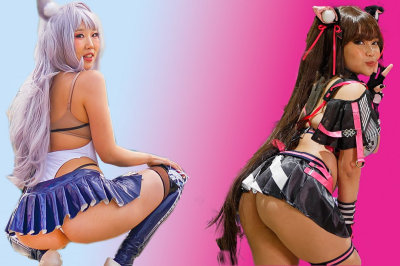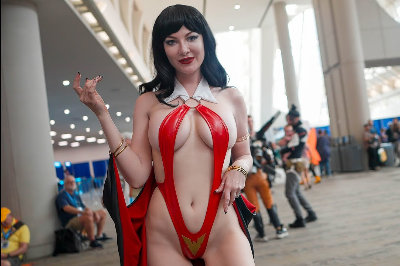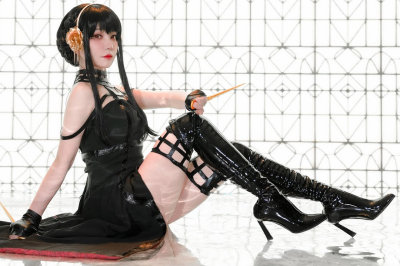THE QUIET AMERICAN - Q&A with BRENDAN FRASER
What was the appeal of playing a character like Alden Pyle?
He was complex. The man has a separate agenda than the one he purports to have. I was drawn to the part for its complexity, elements of which had not been asked of me yet.
Were you a fan of the Graham Greene novel?
I had to go out and buy a copy of it. To tell you the truth, I didn't know his work until I read the screenplay for THE QUIET AMERICAN that Philip Noyce brought me. I didn't know enough about the historical period. I did my own research. I was interested to find that if you run an Internet search on Vietnam and the war, most of the information you get begins at about 1962, which I think is telling because it is missing the whole period that led up to the reasons why the war happened in the first place. And that's the world of the novel. So I dug deeper and I was awakened to the hundred years of Colonial rule and French occupation and the reasons why that happened.
Philip Noyce sees the novel as the great unmade story of the Vietnam War. Do you agree?
Well, we have seen so many films of the result of the Vietnam War, or as the Vietnamese call it, the American War. We have seen what it is like to be there during the jungle, with the hardships. I don't know one film that tells us how and why it occurred, except for THE QUIET AMERICAN.
What did you make of the 1957 version of the novel made by Joseph L Mankiewicz?
The version done by Mankiewicz, I was told to not see by Sydney Pollock, who said it was full of rampant jingoism...they got it wrong. It was made during the McCarthy era, and writers in Hollywood were being blacklisted, so they turned the story on its ear. It was appalling what they did to the novel. They made it this pro-rah rah jingoistic...it was nothing about what the novel said. It toned down the whole idea of the book, the whole prescient nature of what Greene said. He wrote the novel before what became known as the Vietnam War. Why we haven't seen that film since then, I don't know. It's probably because you can't make a film about Vietnam in the American lexicon without expecting to show the American side. They're only beginning to come to grips with it because an entire generation was affected by it. For that reason, the film is important. But also, while 58,000 American soldiers died, let us not forget that 3 million Vietnamese people died. It was a debacle from start to finish. It shattered the lives of so many people. When we made it, I hoped we would give people a sense of redemption when they saw it, but now, given world events and the terror of September 11, it has become a cautionary tale.
Much was said before the film's release about the film containing anti-American sentiment. How do you feel about that?
It's all in the title. He's the Quiet American because he's dead. Graham killed him for a very good reason. Graham Greene, as I understand it, was quite outspoken in his criticism of American foreign policy. His character in the novel was written as a do-gooder boy-scout, a naïve terrorist de facto murderer. On the other hand, the character believes himself to be an American hero, a freedom fighter. There's a spectacular conflict in that, and it inspires a great deal of controversy, so I have seen so far.
Are you surprised?
No, no. I'm pleased. I'm not surprised at all. It's what the film should do. We're hearing the drums of war banging, and if the film's political and social relevance here today doesn't make people look at the headlines on newspapers, then we're missing the point. The film has great weight. It's not going to change the world - but actors have the power to influence the way people think. We can definitely inspire conscious conversation - and that's a healthy thing.
Do you think that's an important part of an actor's job anyway?
Yes, it is. Not that we provoked much debate in GEORGE OF THE JUNGLE! I think debating whether that was a real tree or not was about as far as we got. But in this case, it has weight, significance and meaning. And, if the audience that sees it has the courage to acknowledge that, we've done our jobs right.
Michael Caine has been very outspoken in pushing the film's release along. Were you involved in this at all?
At the time, that was at Michael's behest. I didn't have a relationship with Mr. Weinstein. Michael is part of the Miramax family, so he can pick up the phone and say 'Listen, Harvey, get on with it! This film is important.' Michael has the motive also that he's going to be 70 years old next year. He's not going to get too many more chances. It's a good film, a good film even before the mirroring political events of the day. It'll be a good film in ten or twenty years, when hopefully people will still be watching it. What it is, is a benchmark personally in my career. And definitely in Michael's too. It has yet to be revealed but I feel it is very important.
You previously worked on GODS AND MONSTERS. Did you consider that a similarly important film?
Y'know, it's funny. The similarity that I notice right now...in my career, both allowed me to play characters that were more complex [than usual], and had ulterior motives and had a subtle dignity. That offset the broader choices that I've made by design. I have always fought for remaining diverse about what to do next. It keeps me more interested in what I do. Personally, I believe the audience is owed by actors to have them stretch and change and grow and do different things. I really appreciate it when you see someone take a chance. More and more I am seeking out those roles, rather than allowing them to come my way.
Do you have your own production company?
One happy day I will, but right now I've got my hands full. I've just become a father.
How are you finding fatherhood?
It's really the culmination of everything I hold dear about love just embodied in one tiny little person. I'm delighted it makes me want to really be the best person I can be.
Back to the film, was Michael attached to the project before you were and was working with him one of the big attractions?
He was, yes. Philip had it for about 13 years, in partnership with Sydney Pollock. Then they got Michael on board, and the last decision was who to cast as Alden Pyle. Michael does you so much good. He's like a tuning-fork around actors. Him being as good as he is, and well-pitched, it makes everyone match their pitch.
Is he the true raconteur everyone says he is?
Oh, fully. He had an audience of probably seven or eight hundred people at the AFI enraptured as we watched clips from his career. Overall, he has this self-deprecating knowledge that underneath it he's just an actor. He has a job to do, and he does it very, very well. It's really not down to him to say how brilliant he is. It's your job and mine to acknowledge that! God, I love the guy! He has the courage to say 'Yeah, this is what I do.' As for the period of his career in the Seventies that people are quick to criticise, well fine, but what were other actors doing? Him and Gene Hackman were the only two guys out there and they were working. They may have been in some crap movies, but they were the best thing about it.
How did you find filming in Saigon?
Wonderful. Challenging. Moving. It's a hustle-bustle city. You compare Saigon with Hanoi, it's really like night and day. Saigon would be like New Orleans, while Hanoi would be like Washington DC. Saigon is hot, full of atmosphere, activity and commerce. Humanity is prevalent everywhere. Children and people are living their lives at the forefront of your experience. You see them on the sidewalk. They're going about their business with dignity. It was just amazing to my Western eyes. It was a huge awakening, because I had such a perception of what it would be like to go to Vietnam. There's a sense of purity about it that may change one day. By the way, the hotels and the food were great!
You've just shot LOONEY TUNES: THE MOVIE. What do you do in that?
I play Brendan Fraser's stunt man, who hasn't been working for him for a while. We don't really know the reason why. I think he was treated poorly. I think Brendan's manhood was threatened by him! So now he's a security guard on the Warner Brothers lot. When Daffy Duck is thrown off the lot, they wind up together as unwilling partners on a journey to save their kidnapped father, played by Timothy Dalton - an actor who has been playing a spy character in a very popular genre of spy film! But he really is a spy, and in order to save him they have to find something called the Blue Monkey, whatever that is. So they go on an around-the-world journey including to Area 52 - 51 doesn't exist, it was created for conspiracies!
Your past choices have indicated a love for animation-of-sorts - MONKEYBONE and DUDLEY DO-RIGHT, for example. Are you attracted to that type of humour?
I embrace it. I embrace the technology mostly. You can indulge in that type of humour. It's all about imagination in the end, right? But unless you believe that there really is something in the room, your audience won't. I saw the STAR WARS movie and Liam Neeson looked as if he was in a different room to everyone else! Anyway, I digress!
How was it working with the director, Joe Dante?
He was fun. He's such a nice guy, for one thing. He loves the genre, a pioneer of it. One of his favourite sayings is 'Now, that's comedy with a capital K!'
How do you look back on the two MUMMY films? Was it surprising how they took off?
Of course it was, are you kidding? Very surprising - but delightfully so. Any actor who is in a film that performs well at the box office is suddenly forwarded excellent scripts. All the good ones are suddenly revealed to you. When I was finishing THE MUMMY RETURNS, Philip contacted me with THE QUIET AMERICAN. I don't know if he would have contacted me if I hadn't - but the point is that your profile goes up, and it becomes possible to do other things. It does your career good, but I had a real good time making them. We had a lot of good laughs. Thinking back on it, it pleases me to think that people watched them.
You were raised all over the world - what did that give you?
Tolerance. The ability to be comfortable in my skin wherever I am. It gave me a sense of probably not irony but an arched eyebrow about things. It does the soul good.
Were you shy as a child?
Yes and no. Tuesday - yes, Wednesday, no! I definitely had an imagination I'm told. I had imaginary friends - I guess I'm still speaking to them!
Question and Answer Text Copyright Buena Vista International



